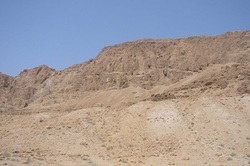Teaching Israel Israel Educators Training Seminar

Image courtesy of www.bigfoto.com
Why Do We Even Teach About Israel? How Should We Teach About Israel?
This session explores participants' personal relationships to Israel, and examines how our own ideological baggage may influence our educational philosophies as Israel Educators. During this session, we will examine four different models of why we engage in Israel Education, as well as four different models of how we teach about Israel.
This Land is My Land, This Land is Your Land
This session explores whether and to what extent it is advisable to include both the traditional Israeli/Zionist consensus narrative, as well as the traditional Palestinian consensus narrative, when educating about the Arab-Israeli conflict. What are the benefits and drawbacks of doing so?
Education v Indoctrination within Israel Education
Most Israel Educators would agree that they want to both develop independent and critical thinking skills, as well as inculcate particular values and attitudes, amongst their students/chanichim. Where do we (and the organizations we represent) draw the line between these two important ideals? As part of this session, we will examine the benefits and drawbacks of three different models that try and answer this question.
The Big Tent
As educators, it should be clear that we want to promote the development of independent, critical and analytical thinking among our campers. At the same time, the movement is, by definition, Zionist, and seeks not only to educate about Israel but to also inculcate a love and appreciation for the People, Land, and State of Israel. It should also be recognized that however hard we might (and should!) endeavor to be objective in our educational approach, as individuals, we bring our own ideological baggage to our role as educators, making this is a difficult (if not impossible!) task, especially when considering the informal teachable moments we facilitate for our campers, outside the context of formal classes/sessions. This session will help us facilitate where we draw the line between who should be considered "inside" and "outside" the tent. Where will you draw the line?
Edutainment
To what extent do we allow market forces to influence our educational decisions? Do we compromise on serious and authentic education in order to offer students/chanichim relevancy and fun? To what extent (if any) might this be understandable/acceptable?
Israel and Jerusalem in Jewish sources
This shiur deals with the theme of Israel and Jerusalem in Biblical, and Talmudic and other Rabbinic literature, discussing whether any lessons regarding the Arab-Israeli conflict today can and should be learned from ancient Jewish sources of yesteryear.
If your organization is interested in ordering this Seminar for your Israel Educators/madrichim, please contact Ilan Bloch, the Director of Teaching Israel, at [email protected]
This session explores participants' personal relationships to Israel, and examines how our own ideological baggage may influence our educational philosophies as Israel Educators. During this session, we will examine four different models of why we engage in Israel Education, as well as four different models of how we teach about Israel.
This Land is My Land, This Land is Your Land
This session explores whether and to what extent it is advisable to include both the traditional Israeli/Zionist consensus narrative, as well as the traditional Palestinian consensus narrative, when educating about the Arab-Israeli conflict. What are the benefits and drawbacks of doing so?
Education v Indoctrination within Israel Education
Most Israel Educators would agree that they want to both develop independent and critical thinking skills, as well as inculcate particular values and attitudes, amongst their students/chanichim. Where do we (and the organizations we represent) draw the line between these two important ideals? As part of this session, we will examine the benefits and drawbacks of three different models that try and answer this question.
The Big Tent
As educators, it should be clear that we want to promote the development of independent, critical and analytical thinking among our campers. At the same time, the movement is, by definition, Zionist, and seeks not only to educate about Israel but to also inculcate a love and appreciation for the People, Land, and State of Israel. It should also be recognized that however hard we might (and should!) endeavor to be objective in our educational approach, as individuals, we bring our own ideological baggage to our role as educators, making this is a difficult (if not impossible!) task, especially when considering the informal teachable moments we facilitate for our campers, outside the context of formal classes/sessions. This session will help us facilitate where we draw the line between who should be considered "inside" and "outside" the tent. Where will you draw the line?
Edutainment
To what extent do we allow market forces to influence our educational decisions? Do we compromise on serious and authentic education in order to offer students/chanichim relevancy and fun? To what extent (if any) might this be understandable/acceptable?
Israel and Jerusalem in Jewish sources
This shiur deals with the theme of Israel and Jerusalem in Biblical, and Talmudic and other Rabbinic literature, discussing whether any lessons regarding the Arab-Israeli conflict today can and should be learned from ancient Jewish sources of yesteryear.
If your organization is interested in ordering this Seminar for your Israel Educators/madrichim, please contact Ilan Bloch, the Director of Teaching Israel, at [email protected]
